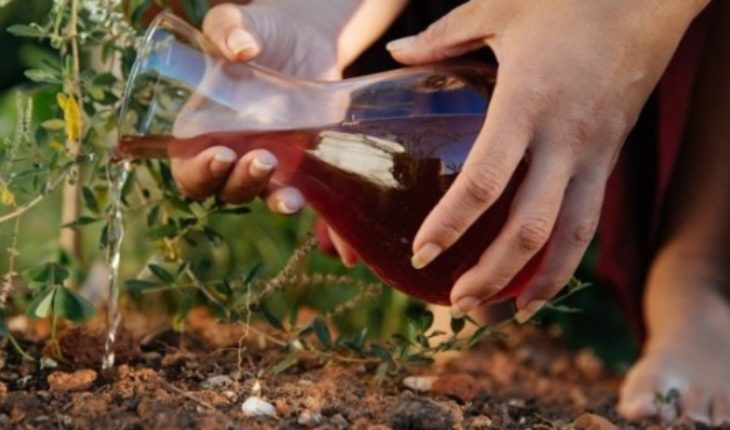Each month, Laura Teixeira performs a ritual in “connection” with Earth.
The 27-year-old woman collects blood from her period, spreads somewhat on her face and dilutes the rest in water, which she uses to water the plants.
The practice called “sowing the moon” is inspired by ancestral traditions that celebrate menstrual blood and consider it a symbol of fertility.
The women who perform these rites have their own ways of celebrating their “moons”, with phases and cycles of different meaning.
Teixeira tells the BBC of her ritual for watering plants: “I’m sorry, forgive me, I love you and I’m grateful.”
“I imagine plants growing beautifully and getting a lot of nutrients,” he says.
When she rubs her body with menstrual blood, Teixeira explains that she simply closes her eyes and feels grateful and with renewed energies.
Laura paints her face and chest with menstrual blood.
“Extremely powerful”
For Teixeira, this ritual is also about empowering women.
“One of the great forms of discrimination is society’s repulson ness towards menstruation, embarrassing women during their period,” she adds.
Sowing the Moon is a “very simple but extremely powerful, healing, and profound exercise for every woman,” according to Morena Cardoso, body and mind therapist, dancer and writer who started World Day of Sowing Your Moon in 2018.
This event attracted 2,000 people who planted their moons together in public spaces.
The idea behind the event, Cardoso explains, is that “menstrual blood, like women, is not a source of shame, but pride and power.”
The event will take place again on August 4.
“The Spiritual Work of Women”
According to Cardoso, some indigenous cultures in North America (including Mexico) and Peru shed menstrual blood on the land to fertilize it.
This practice represented a moment of twinning and spiritual work among women, and the rite of transit from girls to women.
Last year, 2,000 women gathered to “sow their moons” in public.
But in other societies there is an “eminently negative perspective” on menstrual blood, considers Daniela Tonelli Manica, an anthropologist at Unicamp University in Brazil, who has been researching this issue for 20 years.
“Menstruation is considered to be useless bleeding, in the same category as faeces and urine, something to deal with in the bathroom, completely out of sight.”
In the 1960s, feminist movements tried to change that image and motivated women to talk more about their bodies, respecting their autonomy.
Later, some artists joined this trend by exploring menstrual blood symbolism to express political ideas about the environment, sexuality and gender issues.
“Nice place to stay”
“Sowing my moon opened my eyes to see the Earth as a giant uterus that germinates, like ours,” says Renata Ribeiro, who discovered this ritual online.
For Renata Ribeiro, Earth is “like a giant germy uterus.”
“I thought it was just and perfect to give back to Earth what it grants us.”
Ribeiro picks up his period in the shower and then uses it to water a basil plant in a pot.
Its mint plant, however, looks “sticky” and “malnourished,” Ribeiro jokes that the plant was not watered with its blood.
Ribeiro, now 43, remembers what he heard the first time he had his period, in his early teens: “Now you are a young woman, you will bleed with each moon and no one needs to know.”
This was bothering him and that’s why I envied that men didn’t have to go through that. Now, however, he considers his menstrual cycle “sacred”.
The taboo
A global survey of 1,500 women between the ages of 14 and 24 suggests that menstruation remains a taboo topic in many societies.
According to data from this study – commissioned by Johnson & Johnson and conducted in Brazil, India, South Africa, Argentina and the Philippines – women are ashamed to order feminine hygiene products – hygiene wipes, tampons… – and even get up of your chair when you have menstruation.
Menstruation continues to be taboo in many societies.
The short film “Period. End of Sentence” End quote,” in a literal translation, led by young filmmaker Rayka Zehtabchi, tells the story of a group of women in the Indian region of Hapur, in their attempt to make sanitary towels more accessible to the collective.
One of the women in the documentary refers to her period as “unclean blood” and another admits that, faced with the inability to get sanitary towels, she decided to drop out of school.
Cecilia Sardenberg, an anthropologist at the Federal University of Bahia, recalls that she had her first period at a time “when it was rarely talked about it openly.”
Women who today do not feel ashamed of their menstruation “are very important” to combat stigma, he considers.
Controversy
But not everyone is ready to accept the practice of sowing the Moon.
Laura Teixeira checked after publishing a self-portrait last June showing her face and chest painted with menstrual blood.
“I had 300 followers and I expected it to be another publication to help women understand the issue,” she said.
Four days later, he discovered how they mocked her on an account of Memes on Instagram.
A controversial Brazilian comedian, Danilo Gentili, posted on his social media account: “Menstrual blood is normal, what is abnormal is to stain your face with it.”
But his joke turned against him: he received more than 2,300 comments, most of them negative.
For Teixeira, this episode is one more example of how this topic remains taboo.
“People think that if something isn’t common to them, it’s an aberration. They think they can hide behind their mobile phones and use hate fults to hurt others,” says Laura.
“This is the fluid of my body and I decide what is abnormal or not. I’m not interfering in anyone’s life.”
According to Teixeira, the “abnormal thing should be to smear other people. I will only stop (my cause) on the day when menstruation is normal and prejudices, aberration.”
Brunette Cardoso thinks menstrual blood is “a source of pride and power.”
translated from Spanish: “Sowing the Moon”: the ancestral tradition of women who honor menstruation
July 25, 2019 |





